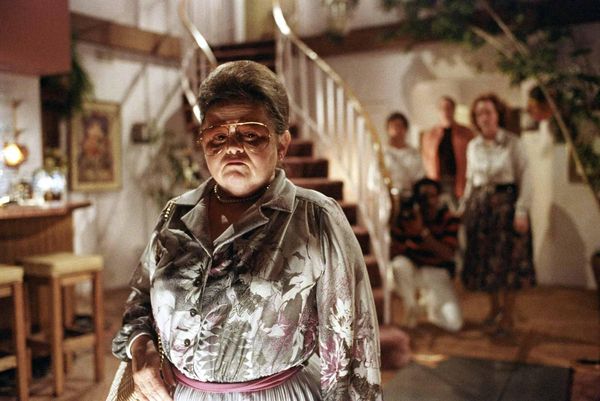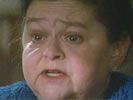Eye For Film >> Movies >> Poltergeist (1982) Film Review
Poltergeist
Reviewed by: James Gracey

Directed by Tobe Hooper and produced by Steven Spielberg, Poltergeist is a slick, big budgeted, special effects laden extravaganza. That it is also well-written, has ensured its classic status throughout the years. It marked Hooper’s first major mainstream success, and in comparison with his earlier film work, is immensely tame (not surprising given that it’s produced by Spielberg, who apparently kept Hooper on a tight leash). It is not without its nastier moments though; the scene in which the paranormal investigator scratches off his own face in front of a bathroom mirror is typical Hooper imagery.
The influence of Spielberg (who co-wrote the screenplay with Mark Victor and Michael Grais) is overwhelmingly evident in the film’s representation of the all American family, and their pursuit of the American dream. With Hooper in the director’s chair though, these moments appear almost satirical, and cracks soon begin to appear. To the family’s horror, they realise their white, middle-class American dream is built upon the graves of indigenous people, and their suburban ideal crumbles when vengeful spirits abduct their young daughter, Carol-Anne...

Various items associated with domesticity and suburban family life take on sinister qualities throughout: dolls, garden trees, closet doors. The most effective use of domestic items as conduits for evil though, is the humble TV set. That the forces of evil gain entry to the Freeling household through various tellies is wryly telling; it was around this time that debates raged regarding the negative influence of television on family life, with increasing levels of adult content broadcast directly into the living room for all the family to see. There are TV sets in almost every room in the Freeling house, and to highlight the apathy surrounding parental supervision of family TV viewing, there’s a moment when Dianne scolds Carol-Anne for watching a channel displaying white noise, and switches it to another channel broadcasting a violent war movie.
As well as the corrupting influence of television, Poltergeist provides a sly commentary on the tribulations of suburban life, colonialism, the ill-treatment of Native Americans, the break-down of the nuclear family unit, and the damaging excesses of capitalism and consumerism. One of the most pointedly telling scenes depicts Diane and Steve in bed; she is smoking pot and reminiscing, he is reading Reagan: The Man, The President. This image highlights the notion of ex-hippies conforming to ‘the Man’, and succumbing to middle-class conservatism. There’s some interesting and subversive role reversal too, as Steve is rendered increasingly impotent, or in some cases completely absent from proceedings, while Diane becomes more proactive. It is she who ventures to the Other Side to reclaim their daughter, and she who must fight for their daughter when the ghosts attempt to snatch her back. This has led some critics to view Poltergeist as a veiled metaphor for divorce and its fracturing effects on the family unit.
The film is most successful in its depiction of a normal, everyday family finding itself in increasingly extraordinary and terrifying situations. The screenplay is peppered with little observational moments and interactions (Dianne helping Carol-Anne bury her dead canary; Steve teaching the children how to tell when a storm is moving away by counting between lightning and thunder; the cosy chaos of family meals; Dianne recognising her own former rebellious streak manifested in her daughter when she rebukes lewd construction workers; the bond that forms between the family and the investigators who move in to help them). These moments flesh out individual characters and establish dynamics that will be later be threatened.
Elements of The Amityville Horror also find their way into the screenplay, with the central idea of a family plagued by malevolent forces in their own home and turning to unexpected sources for help. Poltergeist is so much more than a simple ghost story though, and that it manages to be so in such a compelling and endlessly entertaining way, speaks of its enduring appeal as a classic of horror cinema. Its influence on the likes of recent horror titles such as Insidious and The Conjuring is particularly notable.
Reviewed on: 12 Sep 2014


















